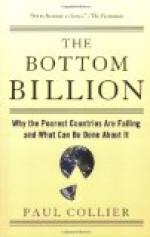I
O well for him whose will is strong!
He suffers, but he will not suffer long;
He suffers, but he cannot suffer wrong.
For him nor moves the loud world’s
random mock;
Nor all Calamity’s hugest waves
confound,
Who seems a promontory of rock,
That, compass’d round with turbulent
sound,
In middle ocean meets the surging shock,
Tempest-buffeted, citadel-crown’d.
II
But ill for him who, bettering not with
time,
Corrupts the strength of heaven-descended
Will,
And ever weaker grows thro’ acted
crime,
Or seeming-genial venial fault,
Recurring and suggesting still!
He seems as one whose footsteps halt,
Toiling in immeasurable sand,
And o’er a weary sultry land,
Far beneath a blazing vault,
Sown in a wrinkle of the monstrous hill
The city sparkles like a grain of salt.
Alfred Tennyson.
[Illustration: EVERARD JACK APPLETON]
FABLE
To be impressed by a thing merely because it is big is a human failing. Yet our standard of judgment would be truer if we considered, instead, the success of that thing in performing its own particular task. And quality is better than quantity. The lioness in the old fable was being taunted because she bore only one offspring at a time, not a numerous litter. “It is true,” she admitted; “but that one is a lion.”
The mountain and the squirrel
Had a quarrel,
And the former called the latter “Little
Prig”;
Bun replied,
“You are doubtless very big;
But all sorts of things and weather
Must be taken in together,
To make up a year
And a sphere.
And I think it no disgrace
To occupy my place.
If I’m not so large as you,
You are not so small as I,
And not half so spry.
I’ll not deny you make
A very pretty squirrel track;
Talents differ; all is well and wisely
put;
If I cannot carry forests on my back,
Neither can you crack a nut.”
Ralph Waldo Emerson.
DUTY
When Duty comes a-knocking at your gate,
Welcome him in, for if you bid him wait,
He will depart only to come once more
And bring seven other duties to your door.
Edwin Markham.
From “The Gates of Paradise, and Other Poems.”
PRAYER FOR PAIN
“The thief steals from himself. The swindler swindles himself,” says Emerson. Apparent gain may be actual loss; material escape may be spiritual imprisonment. Any one may idle; but the men who are not content unless they climb the unscalable mountains or cross the uncharted seas or bear the burdens that others shrink from, are the ones who keep the heritage of the spirit undiminished.




